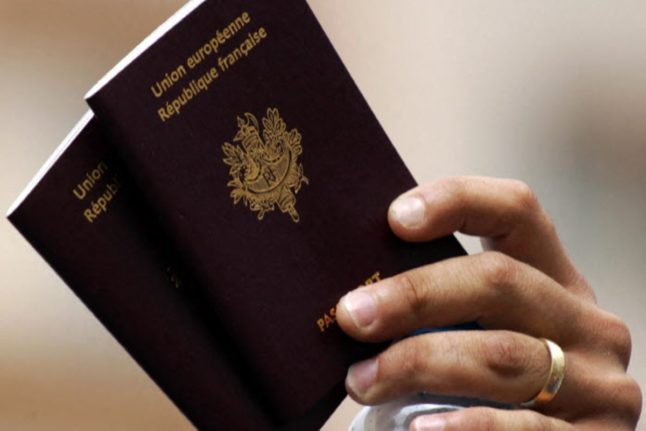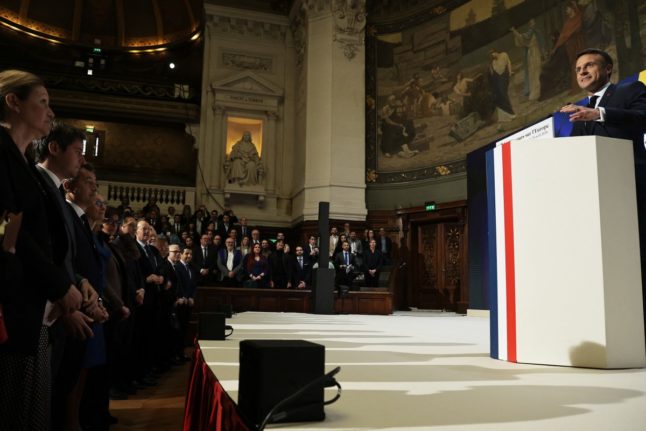The principle of droit du sol is making headlines in France at the moment due to a controversial idea from France’s interior minister (more on that below).
The phrase itself is often translated as ‘birthright citizenship’ and there’s an assumption that this is automatically applied to any child born on French soil.
In reality, it functions very differently in France than in other nations, such as the United States, which confer nationality at birth.
Those born in France to at least one French parent can be French citizens from birth, as can children born outside France to at least one French parent – this is droit du sang (blood right).
Droit du sol (literally translated as ‘soil right’) enables children born in France to foreign parents to acquire French nationality – albeit later in life and with a number of strings attached.
Children covered by droit du sol can obtain French nationality either between the ages of 13-15 or when they turn 18, but they are not born with it.
READ MORE: When are children born in France eligible for French citizenship?
Those born in France to foreign parents can apply to become French between the ages of 13-15 if they meet the following three conditions;
- if they have lived in France on a regular basis (meaning they have spent most of their time in France since the age of 8-years-old),
- if they are living in France at the time of the application,
- if they consent to becoming French.
The process is not automatic – one or both of the child’s parents must apply (via déclaration) on the child’s behalf.
This involves sending in documents including the child’s birth certificate, the parent’s titre de séjour (residency card) if applicable and proof that the child lives in France (eg school records).
READ MORE: French vocabulary you need to know when applying for citizenship
For citizenship at the age of 18, the child must have been born in France, be resident in France on the date of his/her 18th birthday, and they must have been resident in France for at least five years (in total) since the age of 11.
So who is French at birth?
A child whose parents are French at the time of their birth is considered French, even if the child was born overseas.
Otherwise, there are only a few circumstances for children to gain French nationality at birth:
- If one of the parents was born in France, even if they are not a citizen (this is sometimes called double droit du sol)
- If one of the parents was born in Algeria before July 3rd 1962;
- If the child is born stateless – their parents have no legal nationality; the parents are unknown; the parents come from a country where nationality is only given if you were born there.
Could the ‘droit du sol’ change?
Droit du sol has people a political issue for those on the right in recent months.
Right-wing politicians attempted to add limits on citizenship acquired through birth to the new immigration bill, although this was struck down by the Constitutional Council.
The Council refused it due to administrative reasons, but added: “On the merits, the appellant Members criticised these provisions for infringing the principles of equality before the law and of the indivisibility of the Republic.”
More recently, France’s hard-line interior minister, Gérald Darmanin announced plans to limit the right, although only in one part of France.
He announced a radical proposal during a visit to the French island of Mayotte, which is part of a volcanic archipelago called the Comoros between Madagascar and Africa.
Darmanin said he hopes to pass a “constitutional revision” that would abolish the droit du sol in Mayotte only – in an attempt to curtail high immigration rates into Mayotte from neighbouring islands.
This would make the rules in Mayotte different to the rest of France and its other overseas territories.
This is, at this stage, only a proposal and could even require a change in the French constitution if it is not to suffer the same fate as the droit du sol amendment to the recent immigration bill.
It is already proving controversial.
READ MORE: Can France’s Constitution be changed?
In recent years, there has been a significant increase in migration from neighbouring parts of Comoros, which are not French. This has been in part due to Mayotte being wealthier and regarded as more stable than the rest of Comoros, even though it is one of the poorest parts of France, with living standards and wages far below the average in mainland France.
There are already some differences with regard to citizenship in Mayotte – in the rest of France (including other overseas territories) if a child is born to foreign parents, they can obtain French nationality as described above.
In Mayotte there is an extra condition – as well as having been born in Mayotte, at least one of the parents must also have been legally on French territory for at least three months at the time of birth.



 Please whitelist us to continue reading.
Please whitelist us to continue reading.
Member comments